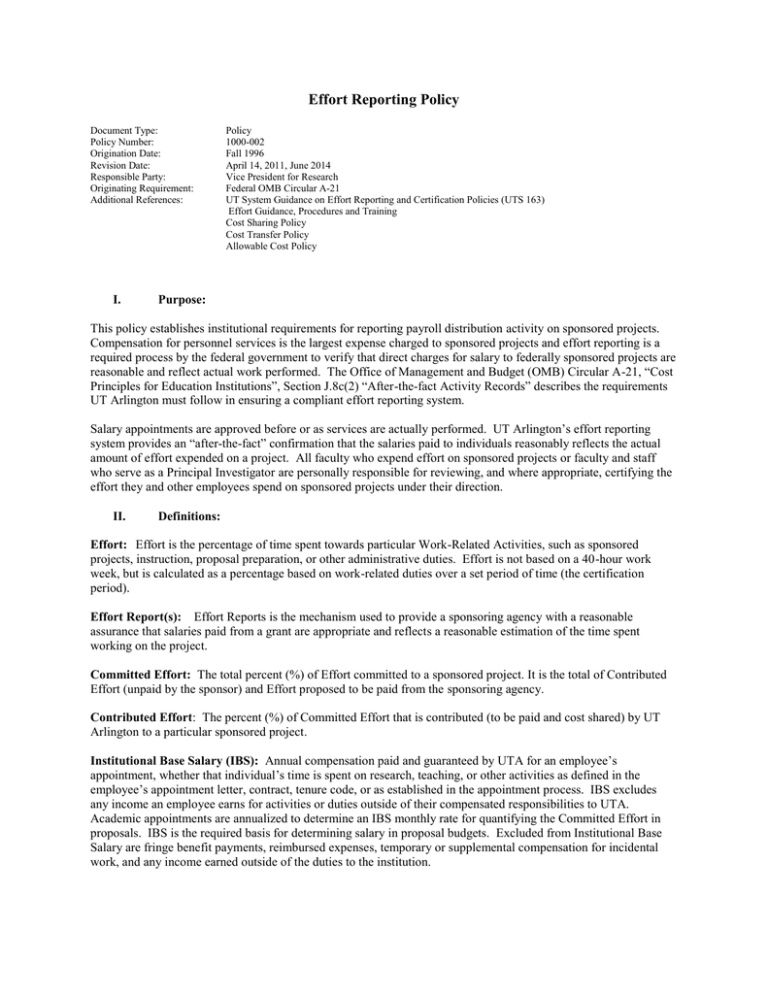Effort Reporting Policy
advertisement

Effort Reporting Policy Document Type: Policy Number: Origination Date: Revision Date: Responsible Party: Originating Requirement: Additional References: I. Policy 1000-002 Fall 1996 April 14, 2011, June 2014 Vice President for Research Federal OMB Circular A-21 UT System Guidance on Effort Reporting and Certification Policies (UTS 163) Effort Guidance, Procedures and Training Cost Sharing Policy Cost Transfer Policy Allowable Cost Policy Purpose: This policy establishes institutional requirements for reporting payroll distribution activity on sponsored projects. Compensation for personnel services is the largest expense charged to sponsored projects and effort reporting is a required process by the federal government to verify that direct charges for salary to federally sponsored projects are reasonable and reflect actual work performed. The Office of Management and Budget (OMB) Circular A-21, “Cost Principles for Education Institutions”, Section J.8c(2) “After-the-fact Activity Records” describes the requirements UT Arlington must follow in ensuring a compliant effort reporting system. Salary appointments are approved before or as services are actually performed. UT Arlington’s effort reporting system provides an “after-the-fact” confirmation that the salaries paid to individuals reasonably reflects the actual amount of effort expended on a project. All faculty who expend effort on sponsored projects or faculty and staff who serve as a Principal Investigator are personally responsible for reviewing, and where appropriate, certifying the effort they and other employees spend on sponsored projects under their direction. II. Definitions: Effort: Effort is the percentage of time spent towards particular Work-Related Activities, such as sponsored projects, instruction, proposal preparation, or other administrative duties. Effort is not based on a 40-hour work week, but is calculated as a percentage based on work-related duties over a set period of time (the certification period). Effort Report(s): Effort Reports is the mechanism used to provide a sponsoring agency with a reasonable assurance that salaries paid from a grant are appropriate and reflects a reasonable estimation of the time spent working on the project. Committed Effort: The total percent (%) of Effort committed to a sponsored project. It is the total of Contributed Effort (unpaid by the sponsor) and Effort proposed to be paid from the sponsoring agency. Contributed Effort: The percent (%) of Committed Effort that is contributed (to be paid and cost shared) by UT Arlington to a particular sponsored project. Institutional Base Salary (IBS): Annual compensation paid and guaranteed by UTA for an employee’s appointment, whether that individual’s time is spent on research, teaching, or other activities as defined in the employee’s appointment letter, contract, tenure code, or as established in the appointment process. IBS excludes any income an employee earns for activities or duties outside of their compensated responsibilities to UTA. Academic appointments are annualized to determine an IBS monthly rate for quantifying the Committed Effort in proposals. IBS is the required basis for determining salary in proposal budgets. Excluded from Institutional Base Salary are fringe benefit payments, reimbursed expenses, temporary or supplemental compensation for incidental work, and any income earned outside of the duties to the institution. Total Effort: For any given time period, the total appointed time in the payroll system and totality of all WorkRelated Activities paid is the Total Effort or 100% effort of the employee. If an employee is only appointed at 80% time in the payroll system, this appointment or time constitutes that person’s 100% Total Effort. The total number of hours worked does not affect Total Effort. For example if a person worked 20 hours or 40 hours a week, either equates to 100% of their Total Effort Work-Related Activities: For the context of this Effort Reporting Policy, Work-Related Activities are areas in which faculty or staff expend their Total Effort towards all duties assigned or conducted on behalf of the university. Activities typically include: Research (sponsored projects), Instruction (teaching/instructing students), Administrative duties (Chair, Dean, Proposal Preparation etc.), and other activities (as assigned). Only activities for which the employee is paid by the university to perform (as part of IBS) are considered “Work-Related Activities”. III. Roles and Responsibilities: Vice President for Research (VPR): The VPR is responsible for the university’s compliance to the Time and Effort Reporting policy. The centralized administrative offices are responsible for facilitating compliance with Time and Effort Reporting in conjunction with the VPR. Office of Grant and Contract Services (GCS): Is responsible for reviewing Committed Effort and IBS in proposal submissions. GCS is the centralized steward for Effort Reporting. GCS oversees payroll corrections or Cost Transfers as necessary, implements the training program and monitors compliance. Office of Grant and Contract Accounting (GCA): GCA reviews and creates any necessary journal entries to correct payroll as appropriate and in conjunction with the department or initiator of the correction. Principal Investigator/Project Director (PI/PD): Is responsible for understanding the Time and Effort Policy, reviewing and certifying Effort Reports for sponsored projects under their direction, proposing salary costs at IBS in proposals, fulfilling Committed and Contributed Effort requirements, and the timely certification of Effort Reports. Each PI/PD must verify that the report includes the names of all individuals who were paid from project funds; that the percent time listed on the report is accurate; and that cost share is accounted for if the PI/PD or any support personnel committed and contributed cost sharing towards the project while being paid from non-federal sources. If, after reviewing the Effort Report, the PI/PD determines that corrections are needed to the actual payroll charges, these corrections must be made immediately and corrected in the payroll system. Primary Individual/Faculty Member (non- Principal Investigator/Project Director (PI/PD): Is responsible for understanding the Time and Effort Policy, reviewing and certifying Effort Reports for their sponsored project effort, fulfilling Committed and Contributed Effort requirements, and the timely certification of Effort Reports. If, after reviewing the Effort Report, the Primary Individual determines that corrections are needed to the actual payroll charges, these corrections must be made immediately and corrected in the electronic payroll system. Directors, Chairs, Deans and Employee Supervisors: Are responsible for reviewing and considering the reasonableness of their faculty or employee Committed Effort and Total Effort for proposals submitted. The GCS Proposal Review and Certification Form (BlueSheet) is the document approved by administrative personnel acknowledging and approving faculty and employee time committed to proposals. Consideration for the allocation of Work-Related Activities is necessary to ensure employees have reasonable time to fulfill their Committed Effort. IV. Scope: This policy applies to all individuals who have salaries or wages paid from or Committed Effort towards sponsored programs. V. Policy: PI/PD’s, faculty or person’s having firsthand knowledge of employee effort on sponsored programs must certify that their effort and effort of their support personnel paid from grant funds was reasonably expended. For determining “reasonableness”, OMB Circular A-21 states “In an academic setting, teaching, research, service and administration are often inextricably intermingled. A precise assessment of factors that contribute to costs is not always feasible, nor is it expected. Reliance, therefore, is placed on estimates in which a degree of tolerance is appropriate… The payroll distribution system will … (ii) reasonably reflect the activity for which the employee is compensated by the institution…” Each individual’s certified Effort may not exceed more than 100% and must be consistent with his/her duties as agreed with his/her supervisor. Consideration for Minimum Level of Effort: For Federal Research projects, there must be a minimum of 1% committed effort of any one key personnel time either paid or unpaid by the sponsor. Equipment and instrumentation grants or dissertation grants do not require a minimum level of effort. Consideration for Maximum Level of Effort: Consideration for maximum effort should be reasonably accounted for. For example, any person who has administrative duties, instructional requirements, or office duties may not be charged 100% to sponsored projects as they must have some measurable amount of effort to account for these activities. The maximum level of effort is 100%. Cost Transfers: Any changes to an effort report must be accompanied by a corresponding change to the payroll system to correct the expense. The PI and their department should make corrections as soon as the need for a correction is identified. Consideration for Sponsoring Agency Salary Cap: Sponsors may impose a cap on the reimbursement of salaries. Sponsor imposed salary caps restrictions require additional consideration for the commitment and certification of effort for individual’s whose IBS exceeds the salary cap. Salary Cap restrictions force an automatic situation of Contributed Effort where Total Effort is split between Contributed Effort (for the salary that exceeds the salary cap) and effort allowed to be charged to the sponsor (salary allowed under the salary cap). The salary cap restriction requires consideration for the tracking of cost share and Committed Effort in Effort Reports. Disciplinary action may be brought against any individual who certifies a falsified report. In addition, the Office of the Vice President for Research withholds the right to take any corrective action for individuals who do not certify effort in a timely manner or incorrectly certify effort in accordance to this document and related guidance documents. This includes but is not limited to, the freezing of salary expenditures on a sponsored project account, removal salary charged to a sponsored project to a department account or other actions to ensure compliance.


